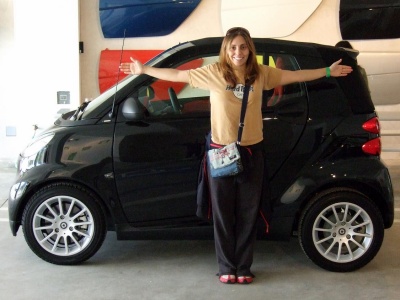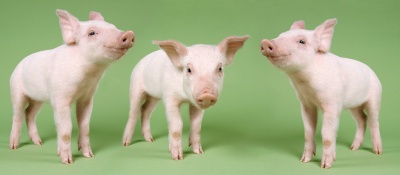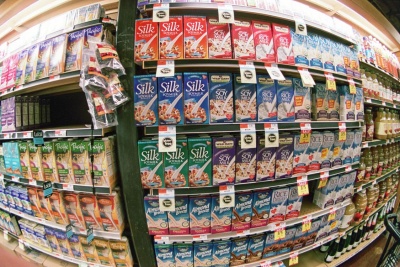 From the Editors of E/The Environmental Magazine
From the Editors of E/The Environmental Magazine
Dear EarthTalk: I've suddenly been seeing a lot of those tiny "Smart Cars" around. Who makes them and what is their fuel efficiency? And I'm all for fuel efficiency, but are these cars safe? -- David Yu, Bend, OR

The EPA rates the Smart Car's fuel efficiency at 33 miles per gallon for city driving and 41 on the highway. Three Smart Cars with bumpers to the curb can fit in a single parallel parking spot. (Photo: tatianes, courtesy Flickr)
Originally the brainchild of Lebanese-born entrepreneur/inventor Nicolas Hayek of Swatch watch fame, Smart Cars are designed to be small, fuel-efficient, environmentally responsible and easy to park-really the ultimate in-city vehicle. Back in 1994, Hayek and Swatch signed on with Daimler-Benz (the German maker of the venerable Mercedes line of cars) to develop the unique vehicle; in fact, the company name Smart is derived from a combination of the words Swatch, Mercedes and the word "art."
When initial sales were slower than hoped for, Hayek and Swatch pulled out of the venture, leaving Daimler-Benz full owner (today Smart is part of Mercedes car division). Meanwhile, rising oil prices have driven up demand for Smart vehicles, and the company began selling them in the U.S. earlier this year.
Measuring just a hair over 8 feet long and less than five feet wide, the company's flagship "ForTwo" model (named for its human carrying capacity) is about half the size of a traditional car. The U.S. Environmental Protection Agency (EPA) rates the car's fuel efficiency at 33 miles per gallon (mpg) for city driving and 41 mpg on the highway (although actual drivers report slightly lower results). Three ForTwos with bumpers to the curb can fit in a single parallel parking spot.
And with soaring gas prices, the cars have been selling like hotcakes in the U.S. The company's U.S. distributor is working on importing an additional 15,000 cars before the end of 2008, as its initial order of 25,000 vehicles is almost depleted. Some four dozen Mercedes Benz dealers across the country have long waiting lists for new Smart vehicles, which sell for upwards of $12,000.
As for safety, the ForTwo did well enough in crash tests by the independent Insurance Institute for Highway Safety (IIHS) to earn the group's highest rating-five tars-thanks to the car's steel racecar-style frame and liberal use of high-tech front and side airbags. Despite such good safety performance for such a tiny car, IIHS testers caution that larger, heavier cars are inherently safer than smaller ones.
Beyond safety concerns, some analysts bemoan the ForTwo's price tag as unnecessarily high given what you get. The cars are not known for their handling or acceleration, although they can go 80 miles per hour if necessary. The website Treehugger.com suggests that eco-conscious consumers might do better spending their $12,000 on a conventional sub-compact or compact car, many which get equivalent if not better gas mileage not to mention likely faring better in a crash.
But for those who need a great in-city car for short errands and commutes, today's ForTwo might be just the ticket. Environmentalists are hoping Smart will release the higher mileage diesel version of the ForTwo, which has been available in Europe for several years, in the U.S. soon. And they are keeping their fingers crossed for a hybrid version which could give the hugely successful Toyota Prius-which looks almost huge in comparison-a run for its money in terms of fuel efficiency and savings at the pump.
CONTACTS: Smart USA, www.smartusa.com ; IIHS, www.iihs.org .
Dear EarthTalk: What's the story with animal cloning? Is the meat industry really cloning animals now to "beef up" production?—Frank DeFazio, Sudbury, MA

In January 2008, the U.S. Food and Drug Administration (FDA) approved the sale of cloned animals and their offspring for food, despite opposition from animal and consumer advocacy groups, environmental organizations, some members of Congress, and many consumers. Many major food producers say they won't use cloned animals in their products. (Photo: Getty Images)
Cloning has been controversial ever since Scottish scientists announced in 1996 that they had cloned their first mammal, a sheep they named Dolly. While Dolly lived a painful, arthritic life and died prematurely, possibly due to the imperfections of cloning, industry nonetheless began seeking out ways to capitalize on the new technology. Meanwhile, critics bemoan cloning as immoral and a potential health and safety risk, given the as-yet-unknown consequences of eating foods generated in this way.
In January 2008, the U.S. Food and Drug Administration (FDA) approved the sale of cloned animals and their offspring for food, despite fierce opposition from animal welfare and consumer advocacy groups, environmental organizations, some members of Congress, and many consumers.
"Our evaluation is that the food from cloned animals is as safe as the food we eat every day," said Stephen Sundlof, the FDA's chief of veterinary medicine. Meanwhile, the U.S. Department of Agriculture has asked that producers withhold cloned animals, but not their offspring, from the food supply while farmers, processors, grocery stores and restaurants decide how they will respond to the FDA's landmark decision.
Unsurprisingly, industry groups also argue that beef and milk from cloned animals is safe to consume. They cite a 2005 University of Connecticut study, which concluded that beef and milk from cloned cows did not pose any health or safety threats to people consuming it. But critics say that the oft-cited single study was far too limited to yield any meaningful conclusions: Milk and beef was taken from just six cloned animals, and the study did not take into account whether clones were more susceptible to infection or other microbial problems, as many scientists suspect. Other researchers have noted severe deformities in many cloned animals, as well as a higher incidence of reproductive, immune and other health problems.
The Washington, DC-based Center for Food Safety, in a petition it filed in late 2006, declared: "The available science shows that cloning presents serious food safety risks, animal welfare concerns and unresolved ethical issues that require strict oversight." The group announced on September 2, 2008 that 20 leading U.S. food producers-including Kraft Foods, General Mills, Gerber/Nestle, Campbell's Soup and Ben and Jerry's-will not use cloned animals in their products. "The move by these companies represents a growing industry trend of responding to consumer demand for better food safety, environmental and animal welfare standards," the group said in making the announcement.
Given the FDA's green light, consumers' only hope of avoiding cloned animal products may be to appeal to businesses directly not to peddle such items. The Pennsylvania-based American Anti-Vivisection Society, which opposes all forms of animal research and testing, has mounted a campaign to urge McDonald's to forego cloned animals in its 30,000 restaurants worldwide.
CONTACTS: U.S. Food & Drug Administration, www.fda.gov ; Center for Food Safety, www.centerforfoodsafety.org ; American Anti-Vivisection Society, www.aavs.org .
Dear EarthTalk: There seems to be a large selection of soy and other non-dairy milks out there today, even right in the dairy sections of major supermarkets. Why should I opt for soymilk over cow's milk and how do I get the calcium I would lose? -- Barbara Conant, Tacoma, Washington

Tasty and healthy alternatives to cow's milk include those made from soy, rice, almonds, oats—and even hemp. (Photo: cafemama, courtesy Flickr)
There is a lot of debate about whether or not cow's milk is good-or appropriate-for people at all. On the plus side, it is a valuable source of protein, as well as calcium, necessary to help build bones and keep them strong. Some researchers believe that drinking cow's milk reduces the risk of kidney stones, colon cancer and other health problems. But others counter that the saturated fats in cow's milk are big contributors to America's weight problems, let alone high cholesterol levels and artery blockage.
Famed pediatrician Dr. Benjamin Spock, in the last edition of his best selling "Common Sense Book of Baby and Child Care," argued that cow's milk was for baby cows not human children, suggesting that it may be a factor in childhood onset diabetes and in kids' respiratory and ear problems. He encouraged mothers to give infants only human breast milk and to consider soy and rice milk products for older kids.
Chief among available alternatives to cow's milk is soymilk, which has about the same amount of protein but much more fiber than cow's milk. In striking contrast with cow's milk, soymilk actually reduces the body's cholesterol levels. It also contains isoflavones, natural plant hormones that act as antioxidants and have been linked to many human health benefits including the easing of menopause symptoms, protection against prostate problems, better bone health and even a reduction in heart disease and cancer risks.
Many people assume that soymilk has less calcium than cow's milk, which is true-in its pure form, soymilk has only a sixth of the calcium of an equal amount of cow's milk. But producers address this problem by simply fortifying soymilks with calcium to equal the amount in cow's milk. And studies have shown that most people's bodies absorb 75 percent more calcium from soymilk than from cow's milk.
But while the health benefits of soymilk are substantial, it may not be for everyone. Dr. Joseph Mercola, who runs one of the most highly trafficked natural health websites, warns that soymilk can inhibit thyroid performance, so those with pre-existing thyroid issues might want to avoid it. Also, some researchers have shown that soymilk can inhibit the body's absorption of protein and minerals in some cases.
Other tasty and healthy alternatives to cow's milk include those made from rice, almonds, oats-and even hemp. According to the health and wellness website Sixwise.com, almond milk is rich in magnesium, potassium, manganese, copper, the antioxidants vitamin E and selenium, and calcium and "may be one of the more nutritious milk alternatives on the market." It is very low in calories and contains no cholesterol. Rice milk, Sixwise reports, is mainly a source of carbohydrates, and should not be considered a nutritional replacement for cow's milk, though it is "a useful replacement for milk for taste and cooking purposes."
Hemp milk, which is made from the seeds of hemp plants but contains none of the psychoactive ingredients in marijuana, can be a good source of protein, calcium, omega fatty acids and other vitamins and minerals. Another good alternative is oat milk, which is high in fiber, free of cholesterol and lactose, and contains vitamin E, folic acid, and other healthy elements and minerals.
CONTACTS: Dr. Joseph Mercola, www.mercola.com ; Sixwise, www.sixwise.com .


